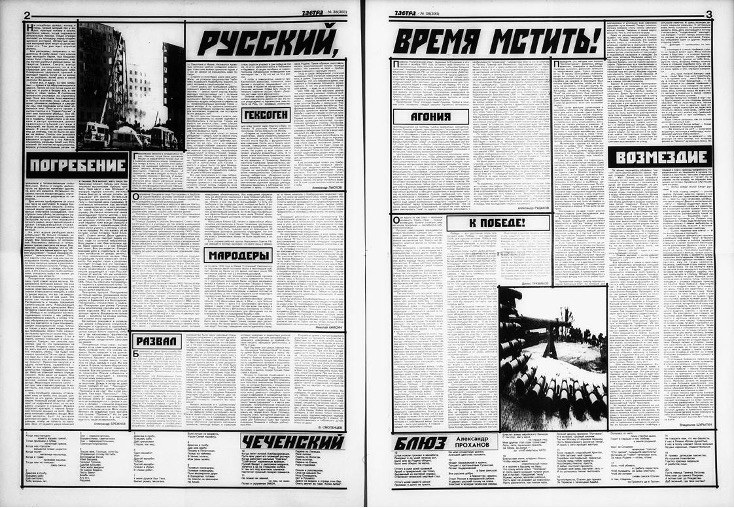Filed Under: Print > Journalism > "Russian, It's Time For Revenge!"
"Russian, It's Time For Revenge!"

Berezovskii gambles in the casino, Gusinskii dances with castanets, Khodarkovskii sweats in a Finnish sauna, All that is good in Russia has been taken to Manhattan. Russia stands in a ripped shirt, And the Russian lays his head on the chopping block. The Chechen battleaxe glistens in the air, The diamond of a Jewish banker sparkles. Ever since I’ve had ice in my heart, My only friend has been a grenade launcher. Fly, fly, melancholy grenade, Over the Terek, beyond the Dunai— to the headquarters of NATO.
The Moscow Peace Treaty, signed 12 May 1997 by Russian President Boris Yeltsin (1931-2007) and Chechen leader Aslan Maskhadov (1951-2005), marked the resolution of the First Chechen War (1994-1996). It promised to build bilateral relations “on the generally recognized principles and norms of international law” with the Chechen Republic of Ichkeria. But it left the central issue of Chechen independence unresolved. Although Maskhadov hailed the treaty as an historic victory and Yeltsin sold it at home as the end of a centuries-long conflict, it hardly lasted two years. In August 1999, Chechen forces under Shamil Basayev (1965-2006) invaded Dagestan and declared holy war.
The Russian nationalist right all but foamed at the mouth. Many had seen the First Chechen War as a humiliating defeat not only of the once-great Russian Army by a small insurgent force, but also of the white, Christian Russian people at the hands of a non-white, Muslim nation. Far-right publications like Zavtra (Tomorrow) filled their pages with broadsides against the weak Yeltsin administration, racist attacks against the Chechens, and calls for revenge. This two-page spread, titled “Russian, It’s Time For Revenge!” collates many of the paper’s frequent themes into an aesthetically and narratively balanced tableau. Beginning with “Burial” in black on the left, three stories tell of “Hexogen,” “Marauders,” and “Dissolution.” The facing page dips into the depths of despair (“Agony”) before calling the reader “To Victory” and “Vengeance.” The image on the upper left shows one of the recently bombed Russian apartment buildings, attacked with an explosive made from hexogen, while, on the bottom right, Russian shells aim at Chechen targets. The spread is accompanied by “Chechen Blues,” a poem by the extremist editor of Zavtra, the poet and novelist Aleksandr Prokhanov (1938-). This work includes both violent images of brutality against Chechens and a virtual whirlwind of ideas, including oligarchs gambling in casinos, the glittering “diamond of a Jewish banker,” and an intercontinental grenade—none of which are explicitly connected to the Chechen War.
The Russian nationalist right all but foamed at the mouth. Many had seen the First Chechen War as a humiliating defeat not only of the once-great Russian Army by a small insurgent force, but also of the white, Christian Russian people at the hands of a non-white, Muslim nation. Far-right publications like Zavtra (Tomorrow) filled their pages with broadsides against the weak Yeltsin administration, racist attacks against the Chechens, and calls for revenge. This two-page spread, titled “Russian, It’s Time For Revenge!” collates many of the paper’s frequent themes into an aesthetically and narratively balanced tableau. Beginning with “Burial” in black on the left, three stories tell of “Hexogen,” “Marauders,” and “Dissolution.” The facing page dips into the depths of despair (“Agony”) before calling the reader “To Victory” and “Vengeance.” The image on the upper left shows one of the recently bombed Russian apartment buildings, attacked with an explosive made from hexogen, while, on the bottom right, Russian shells aim at Chechen targets. The spread is accompanied by “Chechen Blues,” a poem by the extremist editor of Zavtra, the poet and novelist Aleksandr Prokhanov (1938-). This work includes both violent images of brutality against Chechens and a virtual whirlwind of ideas, including oligarchs gambling in casinos, the glittering “diamond of a Jewish banker,” and an intercontinental grenade—none of which are explicitly connected to the Chechen War.
Играет Березовский в казино,
Танцует с кастаньетами Гусинский,
Потеет Ходoрковский в бане финской,
Все русское добро в Манхаттен свезено.
Стоит Россия в продранной рубахе,
И держит русский голову на плахе.
Блистает в воздухе чеченская секира,
Блестит алмаз еврейского банкира.
С тех пор, как у меня на сердце лед,
Мне другом стал один гранатомет.
Лети, лети, печальная граната,
За Терек, за Дунай — до штаб-квартиры НАТО.
Berezovsky gambles in the casino,
Gusinsky dances with castanets,
Khodorkovsky sweats in a Finnish sauna,
All that is good in Russia has been removed to Manhattan.
Russia stands in a torn shirt,
And the Russian lays his head on the chopping block.
The Chechen battleaxe glistens in the air,
The diamond of a Jewish banker sparkles.
Ever since I’ve had ice in my heart,
My only friend has been a grenade launcher.
Fly, fly, melancholy grenade,
Over the Terek, beyond the Danube— to the headquarters of NATO.